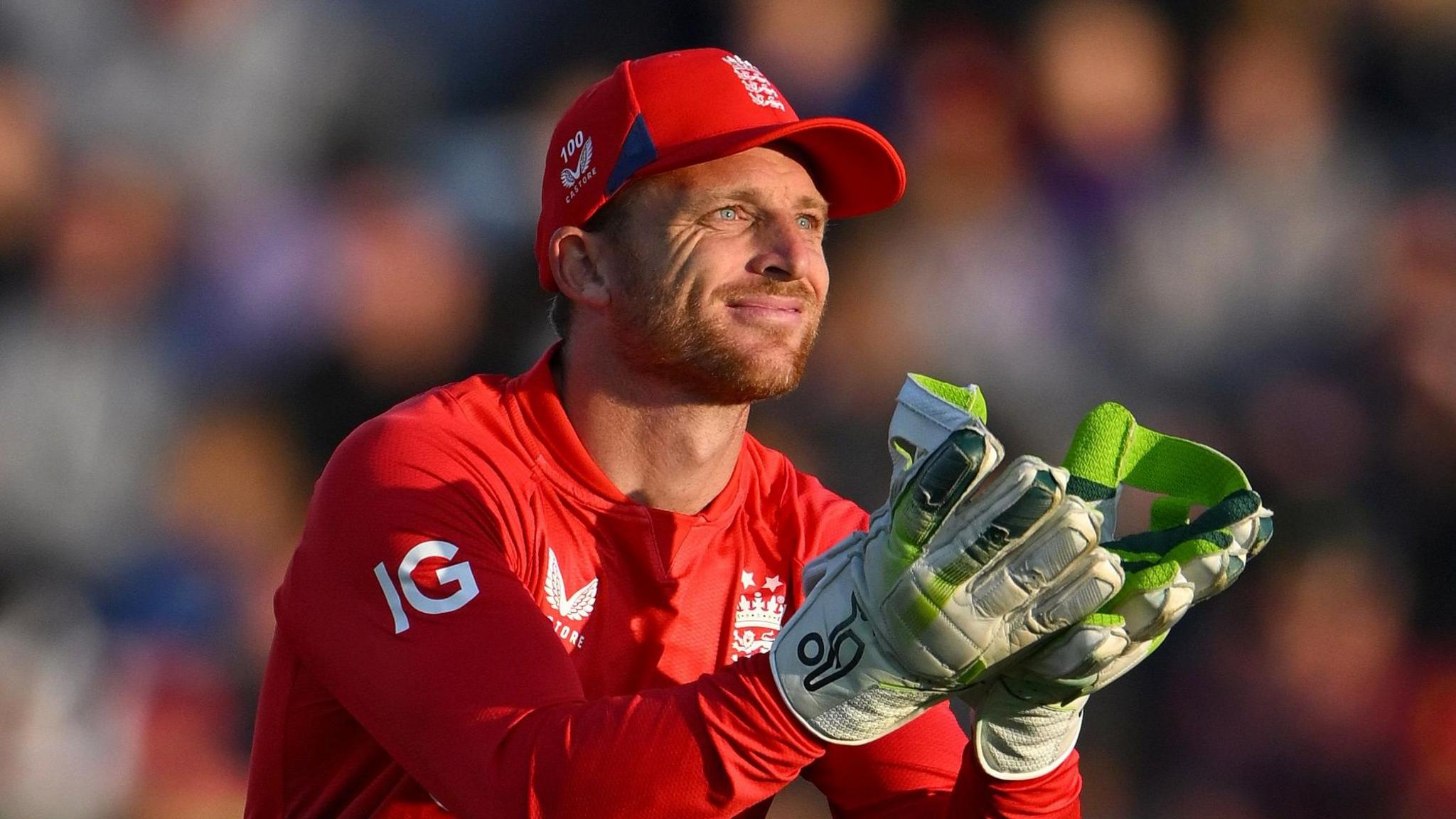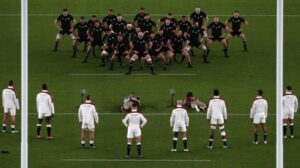To keep or not to keep – Buttler’s big decision
BBC Sport analyses the positives and negatives on whether England captain Jos Buttler should give up the wicketkeeping gloves in white-ball cricket.


When England begin their latest white-ball tour in Antigua on Thursday, they will again do so without their captain.
Jos Buttler’s troublesome calf has kept him out of action since June, forcing him to watch the rebirth of his side without him.
The latest setback has ruled Buttler out of the three-match ODI series against West Indies, although it is hoped he will be fit for the five T20s that follow next week.
It is awkward for Buttler, denying him the chance to set the course before Brendon McCullum arrives as coach in the new year, but has also kicked one question continuing to nag England down the road.
Should the 34-year-old still be trying to do it all as captain, wicketkeeper and premier batter or is it time for Buttler to give up the gloves?
Buttler’s big decision
Buttler has kept in all but two of his white-ball matches for England over the past 12 years but, since he was retained and coach Matthew Mott sacked following this year’s T20 World Cup exit, the whispers from the England camp have suggested a change.
Even had Buttler been fit to play Australia last month, Phil Salt would have kept wicket in Buttler’s place in the T20s with Jamie Smith also primed to do so in the ODIs.
“I was going to give up the gloves and commit to being at mid-off and see how that felt,” Buttler told Sky Sports.
“If it will help me with my captaincy it is something I am open to.”
Buttler has been backed to remain as captain but knows, having overseen two disappointing World Cup exits, he does not stand upon especially firm ground.
At the start of the summer he was resolute.
“I feel like I’ve got the best view. I can see exactly what’s happening and I can make calls,” he said in May about whether he would stay as wicketkeeper.
Now, with a mind focused by a need to improve, the mood has changed.
The case for change
The benefits of Buttler giving up the gloves are obvious.
With a younger, less experienced side he will find it easier to talk his bowlers through pressure situations from the outfield than he can behind the stumps.
In recent years he has relied heavily on Moeen Ali and Chris Jordan to provide the calming voice in a bowler’s ear, with Buttler himself tied to his wicketkeeping position by the ever-more-stringent constraints of the pace of play.
Moeen has since retired and 36-year-old Jordan moved on, leaving Buttler as one of the few experienced heads – and he does not have to look far for an example to follow.
McCullum played most of his career as a wicketkeeper-batter in white-ball cricket only to give up the gloves in 2013 aged 32.
Afterwards he played 41 ODIs across three and a half years, including leading the Black Caps to the 2015 World Cup final – an Indian summer Buttler, who has not scored a century in 33 white-ball internationals since September 2023, would likely take.
Furthermore, the England skipper’s teenage idol, South Africa great AB de Villiers, also played much of his career as a wicketkeeper, but kept in only three of his last 78 matches and averaged 65.
When Buttler has not to kept, in The Hundred, the Indian Premier League and two T20 internationals, since 2021 his average also improves, albeit slightly from 38.43 to 42.22.
A refresh could reenergise an England great’s career.
The case to remain
But if those arguments sound convincing, the reality is less straightforward.
Yes, the sample size is too small to draw definitive conclusions but when Buttler has captained from the outfield there has been no obvious upturn in results – three wins and four defeats his return from seven matches for England and Manchester Originals.
“Being wicketkeeper is a massive benefit in terms of getting tactical information around decision-making,” says Sam Billings, a wicketkeeping captain who has won the 2021 T20 Blast and the past two editions of the Hundred as skipper.
“As a wicketkeeper you can read conditions, field positions, and the angles far better than any other place on the field.”
There have been few more successful white-ball captains than India’s 2011 World Cup-winning skipper MS Dhoni, famed for his tweaks and tactical nous from behind the stumps.
“It is hard to go from captaining and keeping your whole career to change to a captain at extra cover the whole time,” Billings adds.
“[Former England skipper] Eoin Morgan was such a good captain because he had always captained from cover and worked on those conversations.”
There is also, of course, no guarantee that fewer responsibilities means an upturn in results.
McCullum’s career may well have been extended by giving up the gloves but his batting average was just 29.76 after doing so.
Should he want to stay on as keeper, Buttler could easily point to one of his other confidantes, Kumar Sangakkara.
The Sri Lanka great kept wicket until the end and finished his illustrious ODI career with four centuries in his last five matches.
The stats may well tell Buttler whatever it is he wants to hear.
If not Buttler then who?
But if Buttler does decide the team would benefit from giving up the gloves it leaves England with intriguing selection decisions while adding importance to the two weeks to come in the Caribbean.
In T20s the solution is obvious. Salt, currently third in the world rankings, is a regular wicketkeeper and can take Buttler’s place.
The answer in ODIs is less straight-forward.
Salt struggled against Australia, managing just 95 runs across five innings, and leaving doubts over whether he is suited to the longer format.
With Joe Root and possibly Ben Stokes to return in the new year, spaces in the top six will be at a premium.
Smith, also absent for this tour because of his Test commitments, remains the mystery.
McCullum has been gushing in his praise of the Surrey 24-year-old.
In the first squad after McCullum’s appointment was confirmed, Smith was put straight into the XI as keeper and number five – the role Buttler has made his own.
How Smith fits into a side that includes Buttler, Ben Duckett, Joe Root, and Harry Brook is not obvious.
If he bats at six, England would have no significant bowling option in their top order.
England will have to make their final decision in January, when they play India as part of their build-up to February’s Champions Trophy.
It is then that the can will not be able to be kicked down the road any longer.









